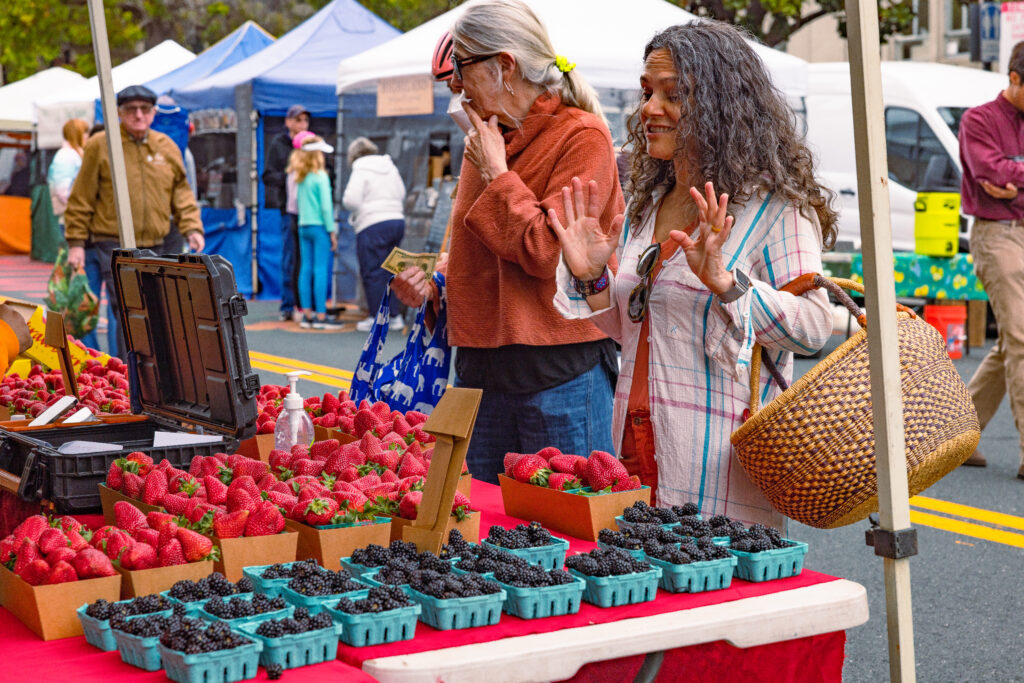City of Berkeley Proclaims Aug. 6-12 “Berkeley Farmers’ Market Week” to Celebrate and Support Local Agriculture
Berkeley, CA – Mayor of Berkeley, Jesse Arreguín, alongside Berkeley City Council members, signed a proclamation on Tuesday declaring August 6-12 as Berkeley Farmers’ Market Week at the July 25th City Council meeting.
Berkeley Farmers’ Market Week will be observed the first week of August each year in conjunction with National Farmers’ Market Week, established by the Farmers Market Coalition, to celebrate the economic, environmental and health benefits of farmers’ markets. The Berkeley Farmers’ Markets will be observing the week with historic and educational displays at their three markets and online.
“[…] The City of Berkeley has long been on the forefront of the farm-to-table movement by recognizing the importance of local farmers’ markets in promoting sustainable agriculture, fostering community connections, and supporting healthy, resilient food systems,” said Berkeley Mayor, Jesse Arreguín, at Tuesday’s City Council meeting, reading from the proclamation.
The Berkeley Farmers’ Markets host approximately 200,000 visits a year, supporting direct sales for more than 70 regional agricultural and artisan food vendors and putting approximately $6 million back into the regional economy according to Ecology Center data.
Tim Muller, longtime Berkeley Farmers’ Market vendor and owner of Riverdog Farms in Guinda, CA, said farmers’ markets were instrumental to the growth of his family farm business, which now includes Community Supported Agriculture (CSA) programs and restaurant sales.
“Farmers’ markets are one of the legs of the stool for us … that’s where it all started for us,” Muller said. “We’re watching multiple generations walking through the [Berkeley] market that we’ve been feeding since 1991. Having EBT, Market Match and WIC is a phenomenal way to make the market affordable for everyone,” Muller said, referring to the food assistance access available at the markets.

Farmers’ markets create a direct marketing system in which local and regional family farmers receive 90 cents of every dollar spent, which is 75% more than traditional distribution models that involve selling to the industrial distributors and retailers that supply most grocery stores.
Historically, the City of Berkeley has led the nation in food systems change, passing one of the nation’s first “Food and Nutrition Policies” in 2001 and has supported three weekly farmers’ markets to address food insecurity and health inequity while giving farmers access to direct sales venues.
Berkeley Farmers’ Markets have also served as an incubator and platform for food entrepreneurs and small businesses such as Blue Bottle Coffee, Cowgirl Creamery, Hodo Soy, the Fatted Calf, Red Bay Coffee, boosting local economic activity and entrepreneurs alongside agricultural vendors.
“If you want to know what’s going on the menu at the local Michelin Starred restaurants just come to the Tuesday Berkeley Farmers’ Market early and look at what produce is on the chefs’ carts,” said Daniel McChesney-Young, Farmers’ Market Program Manager at the Ecology Center. “At the same time, the Ecology Center has played a big role in creating a consistent, accessible market for a wide range of customers and vendors. For example, EBT and Market Match distribution amounted to $307,802 for our vendors in 2022, providing fresh food for those on food assistance.”
The first grassroots community organized farmers’ market in Berkeley formed in 1981, and became a staple in the community by 1987. In 1989, the Ecology Center took on the operations of the Berkeley Farmers’ Markets, and since then they have become deeply ingrained in Berkeley’s culture, advancing beginning farmers, veteran and women-owned farms, and empowering farmworkers to become farm owners.
Joy Moore, longtime farmers’ market shopper and community member, is a strong advocate for the markets. “One of the reasons I love Berkeley is because the Ecology Center sets up three farmers’ markets a week, which means that I can get fresh food three times a week, and I love that. I love the convenience of it; I love the hospitality,” she said.
